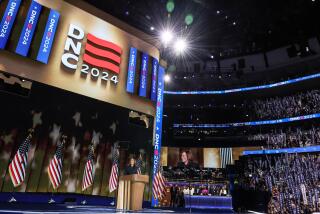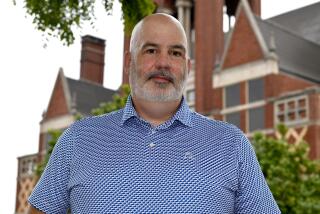Details of Secret Public Broadcasting Study
WASHINGTON — A consultant who secretly monitored four public broadcasting programs last year for the chairman of the Corporation for Public Broadcasting concluded that critics of President Bush got more airtime than those who agreed with him, according to documents released Thursday.
Many interview subjects -- including Republicans -- were classified as liberal because they questioned White House policies.
The bulk of consultant Fred Mann’s reports focused on “NOW with Bill Moyers,” a PBS public affairs program hosted by the liberal commentator until he retired in December. Mann also tracked the political leanings of guests on National Public Radio’s “The Diane Rehm Show” and the PBS talk shows “Tavis Smiley” and “Tucker Carlson: Unfiltered.”
Mann, based in Indiana, had prepared the analysis at the request of Kenneth Y. Tomlinson, the chairman of the CPB, an agency that distributes federal funds to public broadcasters.
More than 100 pages of Mann’s informal summaries were released for the first time Thursday by Sen. Byron L. Dorgan (D-N.D.), who had obtained a copy from Tomlinson.
In a news conference at the Capitol, Dorgan called the report an “amateur attempt to prove that there was a liberal bias.” He dubbed it “nutty” and a “waste of taxpayers’ money.”
In his analysis, Mann categorized guests as “liberal,” “conservative,” “anti-Bush” and “anti-DeLay,” and painted the picture of a broadcasting system awash in liberal viewpoints.
A summary of Moyer’s programs from Oct. 17, 2003, to June 25, 2004, for example, concluded that 92 of 136 segments “clearly opposed administration/government policies.” The consultant also took note of conservatives who did not hew to the administration line.
In one report, he labeled former Rep. Bob Barr (R-Ga.) as opposed to the administration for his criticism that the Patriot Act violated civil liberties. Radio host and former San Diego Mayor Roger Hedgecock was listed as “anti-Bush” for saying the military was underpaid. Sen. Chuck Hagel (R-Neb.) was tagged “liberal” for an interview with Smiley in which he criticized White House policy in Iraq.
Hagel spokesman Mike Buttry called the report “silliness,” adding that the senator’s record “speaks for itself.”
Half a dozen reporters drew scrutiny as well. Associated Press President Tom Curley was listed in a chart as “liberal/Democrat” and under “oppose administration” for discussing whether there was a need for more government openness on Moyer’s program.
Other reporters similarly classified were former NPR anchor Bob Edwards, New York Times reporter David Cay Johnston and Washington Post reporters Dana Priest and Robin Wright.
Through a spokesman, Tomlinson declined to comment, citing an ongoing investigation by the corporation’s inspector general into Tomlinson’s actions.
Details of the report alarmed some of the broadcasters.
“I think it’s pretty outrageous, frankly, and a fairly simplistic way of going about evaluating the worth of a program,” said Rehm, who hosts a Washington public affairs show.
Carlson, a conservative pundit, said he did not object to the monitoring of his PBS show but took issue with the methodology.
“I don’t think bean-counting guests is a particularly accurate way to determine the political bias of a show,” said Carlson, who now hosts a program on MSNBC. “I had mostly liberals on because I disagreed with them and I wanted an interesting discussion.”
The release of the report comes at a tense time for public broadcasting, which has been consumed by an internal debate over partisanship and fairness.
Tomlinson, a Republican, has rankled many with his push for more conservative voices on public television and radio. Some public broadcasting officials and Democratic lawmakers contend that he is undermining CPB’s role as a political firewall.
The chairman has maintained that he is trying to strengthen the system by expanding its appeal. He has said that he commissioned the report without informing the rest of the CPB board in order to learn more about the programming without alarming people in the system.
Dorgan said Tomlinson originally told him that the former CPB president, Kathleen A. Cox, approved hiring Mann but later admitted that she had not.
The senator said he decided to release the material to the public after the CPB board appointed a former Republican Party co-chair as its new chief executive last week.
The consultant Tomlinson chose had worked for two decades at the National Journalism Center, an organization that helped train conservatives for jobs in the media. Mann helped place students in internships and entry-level jobs.
The center’s goal is “get some conservatives out there to balance the system,” said Tim Graham, director of media analysis at the conservative Media Research Center, who attended the program.
“Fred’s a guy who’d say he believed in this mission.”
After leaving the journalism center in 2003 or 2004, Mann apparently moved to Indiana, where he was based when he conducted the content review for Tomlinson. One fax he sent came from a Hallmark store in Indianapolis.
He did not return calls for comment left at an Indianapolis phone number listed under his name, and his e-mail address was no longer valid.
Mann sent several of his reports to the e-mail account Tomlinson had as chairman of the Broadcasting Board of Governors, the agency overseeing government communications abroad, like Voice of America. The subject lines read “Research Project.”
In one report, Mann wrote about a guest appearance Wright made on Rehm’s show last June: “Ms. Wright’s viewpoint was that U.S. intelligence was geared to fight the Cold War and did not adapt to the new threat of terrorism.” He dubbed her “liberal.”
Wright, a former Los Angeles Times reporter, said the report took her comments out of context.
“I stand by the body of more than 30 years of covering U.S. foreign policy,” she said. “I’ve been as critical of Democratic administrations as I have of Republican administrations.”
Public broadcasting officials, including Wayne Godwin, PBS’ chief operating officer, expressed concern that Tomlinson undertook the project in secret.
“I think we can always have a very informed and thoughtful discussion about content,” NPR President Kevin Klose said. “I question whether this is the way to go about it.”
*
Gold reported from New York, Cho from Washington.
More to Read
Sign up for Essential California
The most important California stories and recommendations in your inbox every morning.
You may occasionally receive promotional content from the Los Angeles Times.









